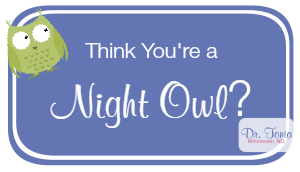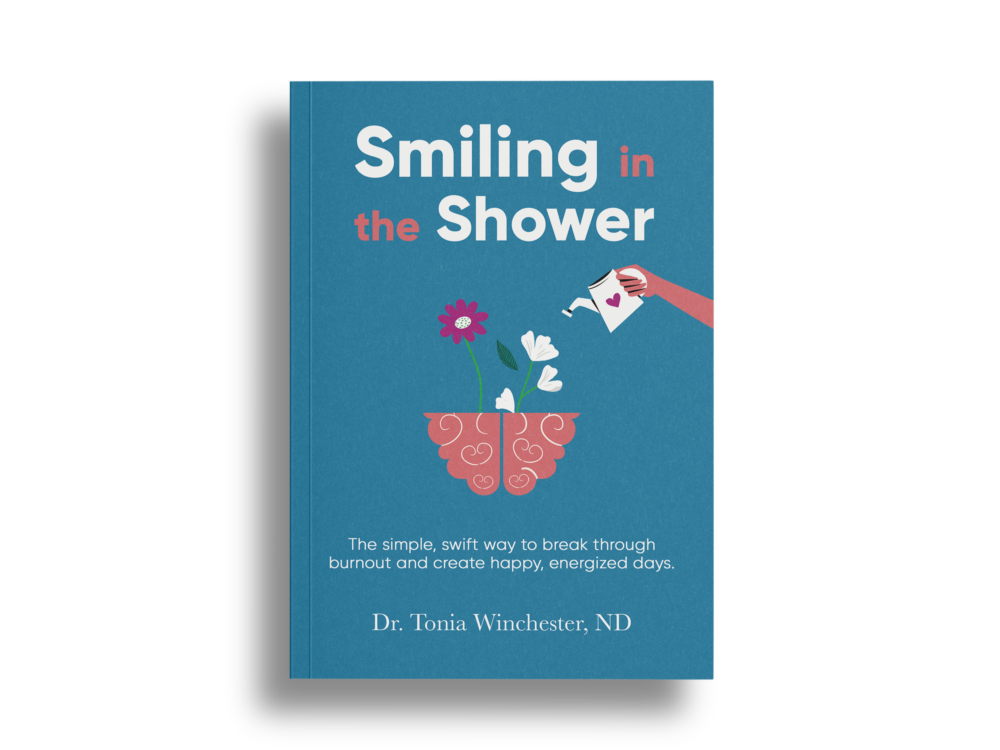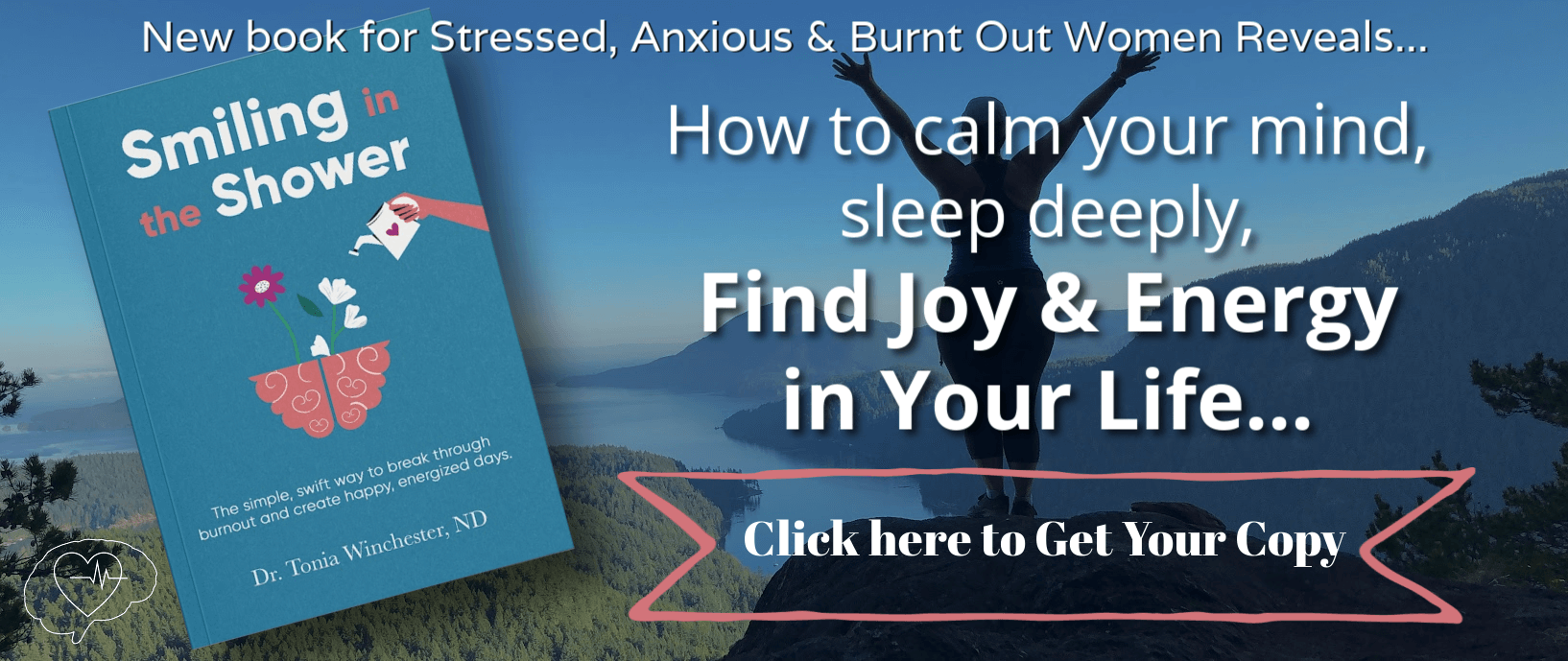 Is there really such a thing as being a night owl?
Is there really such a thing as being a night owl?
I’m a fan of sleeping, both for myself and for my patients. Sometimes I have my own challenges with it – especially when I have been consuming my food allergies. (What? True dat. I wrote about that here.)
We all know sleep is important. It’s when and how we heal, repair, and grow. I know you know this, and I know you know I know you know this. Right? Sure.
Disturbed sleep is something I commonly see in my patients. They say their brains just don’t shut off or that they are night owls. Always have been.
Bubble bursting time.
I don’t think being is a night owl is actually a thing.
At least not for humans. Other creatures sure. But Homo sapiens? Those (us) bad boys are not nocturnal. They (we) are diurnal.
We’re wired to follow a daily rhythm that says we’re awake and alert when Mr. Sun is out shining down on us. Conversely we’re sleeping, growing, and healing when Lady Luna is doing her thing. Or at least we should be.
If you’re wired at night, than something artificial is wiring you. As mentioned we’re wired to sleep at night.
Because of chronic stress, poor lifestyle habits, lack of life-work balance, and shift work people’s clocks can get flipped and their wires crossed. Their awake hormones (like the stress hormone cortisol) are elevated at night and deficient in the day. This is opposite land.
I see this commonly in people who get their “second wind” at 10 pm, and are able to stay up until 1 or 2 pm. This is actually a symptom of adrenal fatigue – when the stress glands are out of balance and wiggedy wack.
You may feel like a night owl, but that is just because your hormones have adapted to chronic stress and the factors I mentioned above. You may say that you’ve always been a night owl even as a wee one. My argument to that is something likely happened when you were in mamma’s belly. Actually these tendencies to flip the diurnal clock can be transferred epigenetically and generationally.
Cortisol is a priority hormone in the body.
It supersedes most other hormones including our sleep hormone melatonin. Think of it as the hormonal bully. This has its evolutionary advantages. Cortisol is the hormone of survival. Several bodily functions get suppressed by cortisol so our bodies can survive. Unfortunately cortisol is not the hormone of thriving.
If cortisol is elevated at night (because of one’s diurnal clock being wonky), then melatonin has no chance of allowing you to sleep soundly through the night so you can recharge and recover, and face the next day with pep and spunk.
How do you put your clock back the right way?
It will take time but it is possible. You need to commit to making changes. Here are some suggestions:
- Ideally shift out of shift work so your body can have what it really craves: predictable routine.
- Honour this routine: Go to bed before 10 pm. The hours you get before midnight are the most important. Don’t let yourself catch your second wind.
- 11 minutes of deep breathing before bed can triple your melatonin while you sleep.
- Have a small protein / fat dense snack before bed to stabilize blood sugar through out the night. 10-12 almonds should do the trick.
- Alcohol can affect your ability to get into a deep sleep so keep this to a minimum.
- People who say they are night owls but drink coffee make me laugh. I’m sorry sugar, but you’re being artificially kept up. Your night owl-ness is a contrived, unnatural state. If it weren’t for the coffee would you still be awake at night? Are you consuming too much caffeine? Find out here.
- Orgasms. Hello! The almighty big O! These pleasurable experiences release oxytocin – the bonding hormone and one of the only hormones in the body that can actually stand up to the bully cortisol and override it.
- Shut off all electronics one hour before bed.
- Aim to get up at the same every morning. Yep. Even on the weekends.
Here is an example of a bed time routine to promote proper sleep / awake cycles:
9 pm – Shut down all electronics. Yep. All. Computer, phone, TV, games… Have a small nut snack and brush your teeth. Do other before-bed hygiene things.
9:10 pm – How about some orgasmic meditation?
9:30 pm – Perhaps some more sexual activity, now that you’re all warmed up.
9:45 pm – Deep belly breathing
10:00 pm – Lights out.
It will take some time to get your diurnal cycle back in harmony with the daily rhythm, but keep at it. The better sleep you get the more you’ll be able to live your healthy, thriving delightful life – which is what I want for all of us.
Interesting to note: Educators in the personal development space say disordered sleep is a sign that you’re not listening to your heart or living a life that lights you up, based on what your intuition tells you.
As a bonus, you’ll be taking preventative steps to avoid all chronic diseases including cancer and heart disease.
Need more help? Brain-Based Transformational Coaching is a great way to help heal chronic stress issues that may be dressing you up as a night owl.
I’d love to know… do you believe in night owls? Let me know in the comments below.
To your healthy, thriving, delightful life,
Dr. Tonia
PS: Be sure to sign up for the Weekly Tonic newsletter for even more practical tips and inspiring tricks to help you live your most delightful life.









Thank you Tonia! I have always been a ‘night owl’, but I also don’t believe in them! This is very timely and useful advice! Thanks for being so wise! (Like an owl 😉